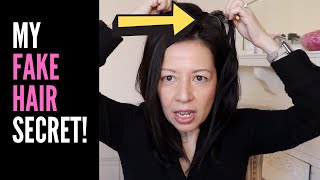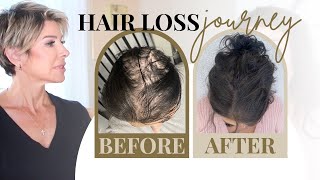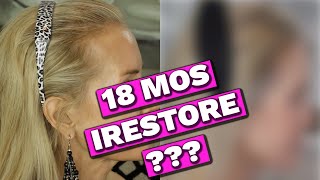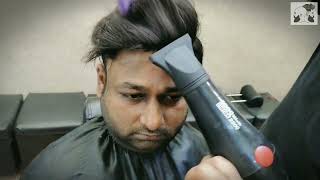Thinning Hair Treatment: How to Stop Hair Loss in Women
Thinning hair is an issue that’s faced by both men and women. In fact, according to the American Hair Loss Association, approximately 40% of hair loss experiences are incurred by women. Fortunately, there are effective ways to treat hair thinning. Check out the facts and ideas below if you want to learn exactly what causes your hair to thin and how to deal with this problem.
Unlike serious hair loss, hair thinning in women is much more gradual and usually does not result in complete baldness. While serious hair loss usually ends up with at least some exposed patches, thinning hair usually means hair remains all over the head, but there is less texture to the point where the scalp looks exposed beneath.
Causes of Thinning Hair
Like many medical conditions, thinning hair can be caused by a variety of factors. First, the myths:
- Hair loss is caused by shampoo.
- Hair loss is caused by age.
- You will definitely lose your hair if your mom or dad did.
All three of these reasons are often given out to explain hair loss, but they are far from being true. More often than not, these myths are generated by companies that want to sell an ineffective hair growth product, or by well-meaning older generations and/or misinformed individuals. We now know much more about what causes hair thinning, and it often has nothing to do with what we suspect.
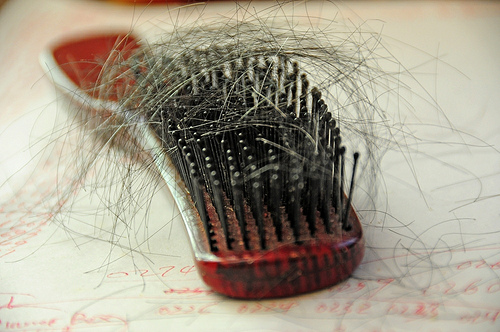
Photo Credit: faungg’s photos, cc
The Genetics Game
If you find yourself asking, “Why is my hair thinning?” — don’t immediately blame your parents. Just because your mom or dad experienced hair loss doesn’t mean you will. However, it does seem to up your chances. Researches show that developing thin hair actually does have something to do with genetics. While you will not have guaranteed hair loss if your parents did, you will be genetically predisposed to it and have a stronger likelihood of thinning as early as your late teens or as delayed as your 40s or 50s.
Medications and Hair Thinning
Certain medications can cause hair to thin. Unexpectedly for women thinning hair can be caused by birth control pills, as sometimes the hormones found in them can affect hair texture. If your hair is changing and you suspect your birth control, consult a doctor to see if you are sensitive to androgens. If your birth control contains a high amount of progesterone, you can be switched to a pill that doesn’t contain hair-loss triggering progestins.
The Stress Factor
Yes, it is true that hair loss can be caused by stress. However, it’s much harder to reach that point of distress than you may think. Hair loss from stress usually comes from physical strains like childbirth, menopause or prolonged, severe illnesses — so there’s likely not much you can do if you want to know how to stop thinning hair through stress reduction. On the bright side, you don’t need to worry about your morning commute causing hair loss.
Other Potential Reasons for Hair Loss
While not as common, hair can also thin due to the following:
- pregnancy;
- an excess of Vitamin A;
- lack of protein;
- anemia;
- thyroid disease;
- autoimmune disorders;
- dramatic weight loss;
- over-processing your hair.
Thinning Hair Treatments and Remedies
While nothing is a sure fix, there are some remedies and treatments available to try.

Photo Credit: colindunn, cc
Surgery
While surgery may seem like a quick and effective fix to thin hair, it definitely is something that requires thorough consideration. Hair transplant surgery involves removing strips of hair from the nape of the head and placing them in sections with thin to no hair. This can be a daunting task depending upon how much natural hair you have remaining, and can also be expensive. Recovery can also be a bit trying, as soreness and pain often occur. If you would like to consider surgery as an option, make an appointment with a hair loss specialist to discuss options and cost. As one of the more pricey treatments, it is also one of the most effective treatments for hair loss if the benefits outweigh the risks for you.
Related Post: What Is Mesotherapy and Does It Stimulate Hair Growth?
Natural Remedies and Best Vitamins for Thinning Hair
Vitamins and supplements are popular for a variety of physical issues, and hair loss is no exception. Here’s a basic list of thinning hair vitamins and supplements touted as hair growth wonder drugs, and their actual proven clinical effectiveness:
- apple – insufficient evidence;
- atlantic cedar – potentially effective;
- beta-sitisterol – insufficient evidence;
- biotin – insufficient evidence;
- coenxyme Q-10 – insufficient evidence;
- garlic – insufficient evidence;
- lavender – potentially effective;
- zinc – ineffective.
Thus, vitamins for thinning hair aren’t always the best idea and might just be a money-waster.
Thin Hair Medications
A lot of people experience hair loss — men usually face the problem of receding hairline, female-pattern hair loss means thinning hair. Though the balding process in men and women is called differently, both men and women desire to seek out a medication that can help. Below we share some of them for your consideration.
#1: Minoxidil (Rogaine)
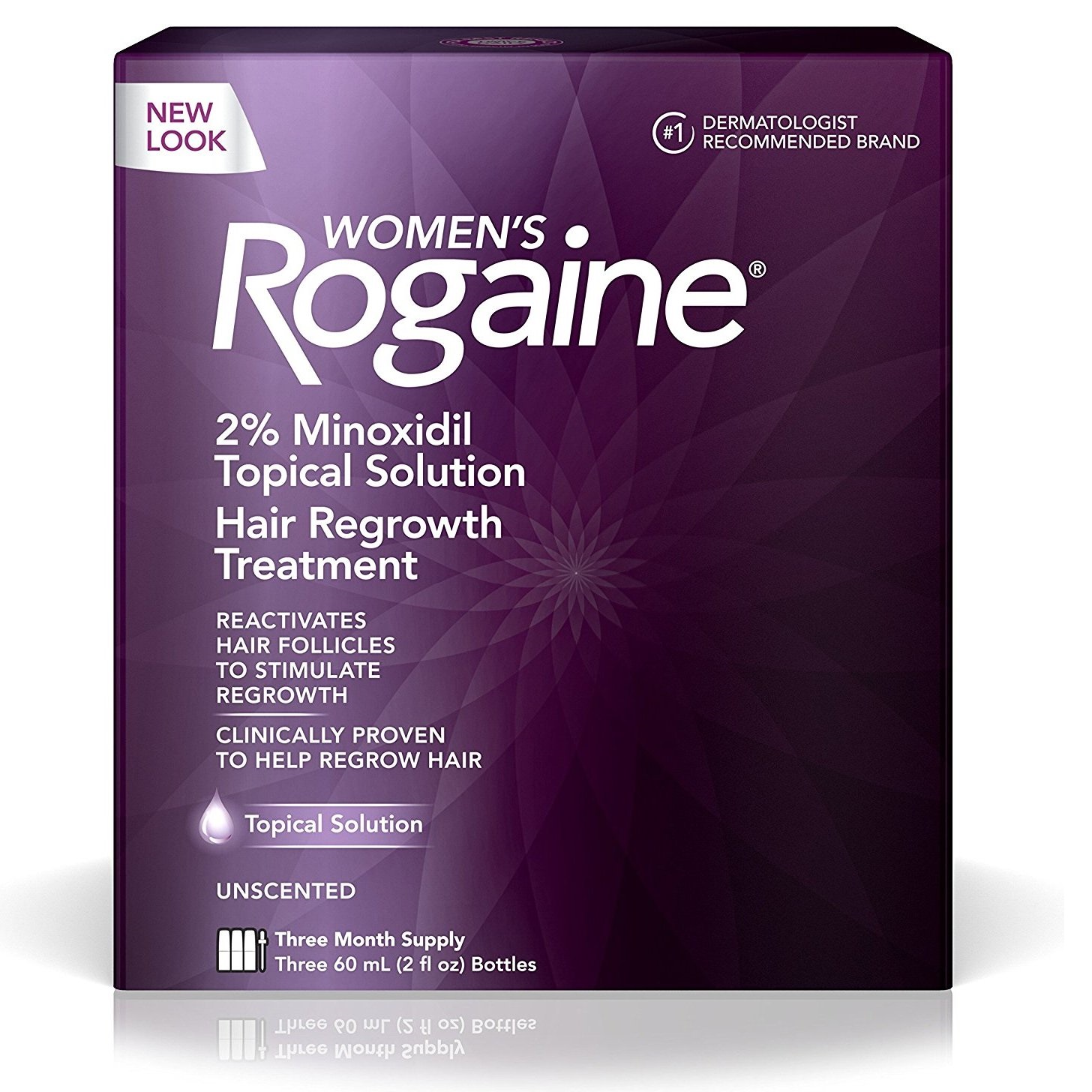 View on Amazon
View on AmazonOne of the most common medications for thinning hair is Minoxidil that you may recognize by its more popular name — Rogaine. Minoxidil is an antihypertensive vasodilator medication. Antihypertensives treat high blood pressure, the term vasodilation refers to the widening of blood vessels. This means that Minoxidil increases the blood circulation in the scalp.
Pros- no prescription is needed
- Minoxidil is helpful for both men and women
- prolongs the time your hair spends in its active growth phase
- restore the size of the hair follicles that are inactive and they begin to produce thicker strands
- is not a natural component
- can cause multiple allergic reactions
- doesn’t work for everyone — 40% of people experience new hair growth,40% find it works well just to prevent hair loss, 20% has no effect
#2: Hairgenics Pronexa Hair Growth Supplement
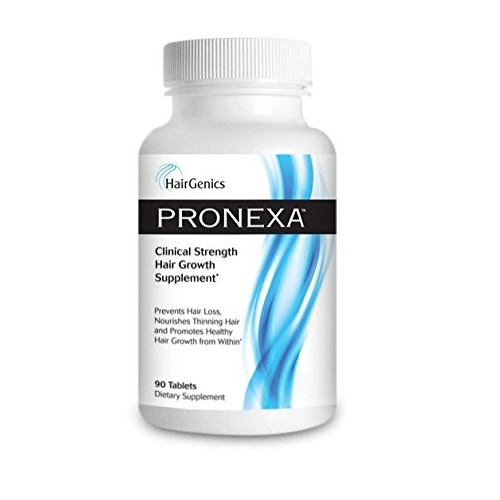 View on Amazon
View on AmazonFDA Certified, clinically studied. In most of the cases people who tried it report thicker, fuller and healthier locks. Pronexa copes with vitamin deficiencies that are usually the cause of hair loss and hair thinning, as it is packed with hair growth vitamins. It provides support to the hair follicle cycle, promotes cell growth. Contains vitamin C, B-1, B-12, B-6, A, D and E, calcium, phosphorus, magnesium, niacin, sodium, zinc, manganese, selenium, iron, iodine, folic acid, pantothenic acid, biotin.
Pros- works for both men and women
- addresses vitamin deficiencies
- promotes cell growth
- is good for nails, skin, joints, and overall health
- has a 30-day money back guarantee
- works better with Hairgenics Pronexa shampoo and conditioner, so you’ll possibly have to buy them too
#3: Nutrafol Thinning Hair & Hair Loss Supplement
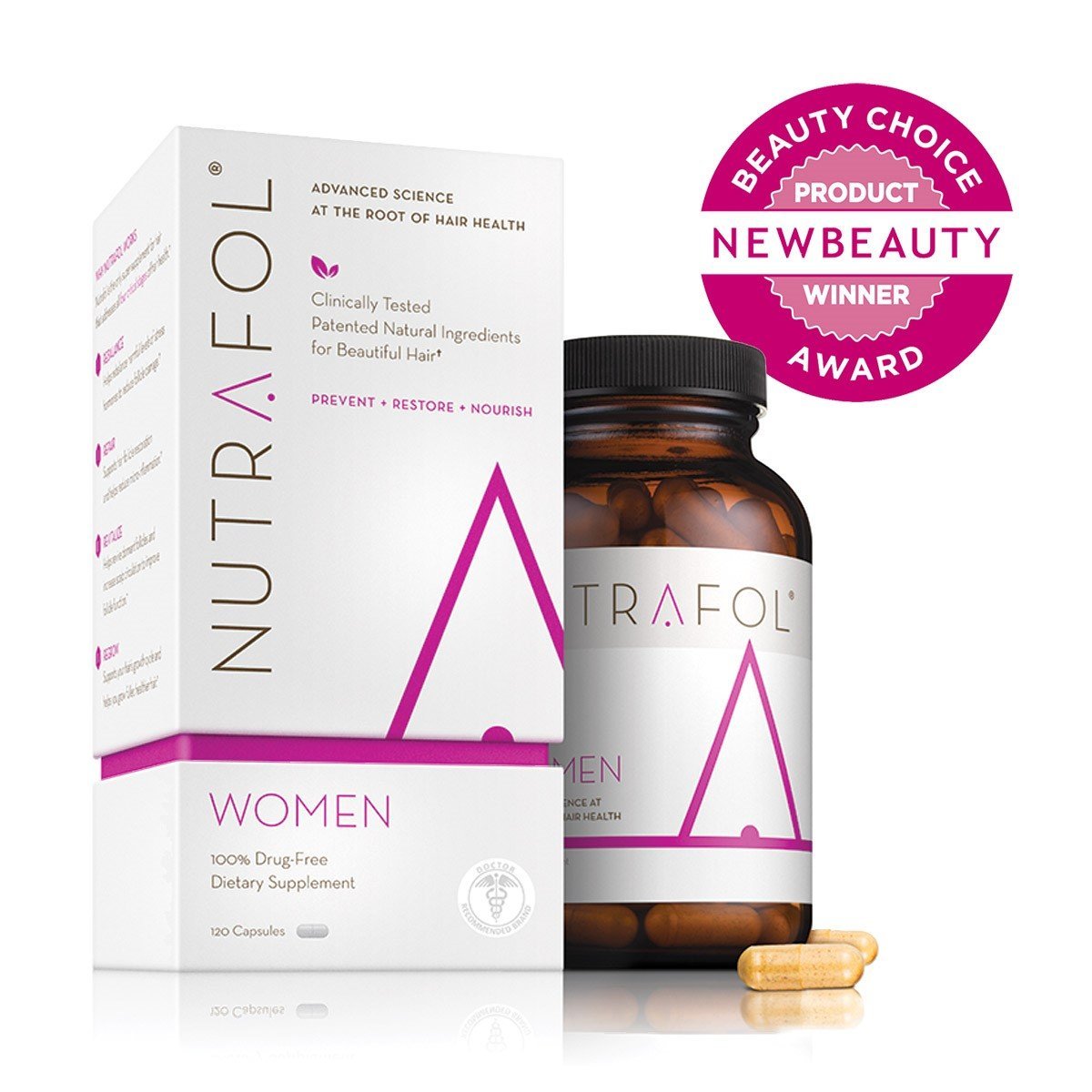 View on Amazon
View on AmazonHair loss occurs due to an accumulation of different causes, i.e. inflammations, everyday stress, hormones, genetics. Solving just the nutritional deficiencies problem can be not enough. Nutrafol is an advanced supplement, that contains several patented and clinically proven nutraceutical ingredients. Among them – EvNolMax (a form of Vitamin E), sensoril ashwagandha, biocurcumin, saw palmetto, cynatine (bioactive keratin), hydrolyzed marine collagen, hyaluronic acid. They repair and revitalize damaged hair follicles, minimize hair shedding and hair loss, promote thicker, fuller, faster hair growth and improve hair texture. Moreover, Nutrafol is a perfect anti-aging solution for your hair.
Pros- contains 20 pure, potent natural ingredients
- helps to cope with inflammations and elevated stress hormones (cortisol)
- rejuvenates the hair follicle environment
- is standardized, optimized for bioavailability, clinically-tested
- high price ($88 per bottle)
- intended for long-term daily use, so you’ll have to buy it regularly (subscription price — $79 per month, with added bonuses)
The Best Product for Thinning Hair
Just like supplements, there is no magic bullet when it comes to the best shampoo for thinning hair. However, there are products you can try. These are all sold at beauty supply shops or online, and include shampoos, conditioners, keratin treatments and body building creams.
#1: Nourish Beaute Vitamins Hair Loss Shampoo and Conditioner
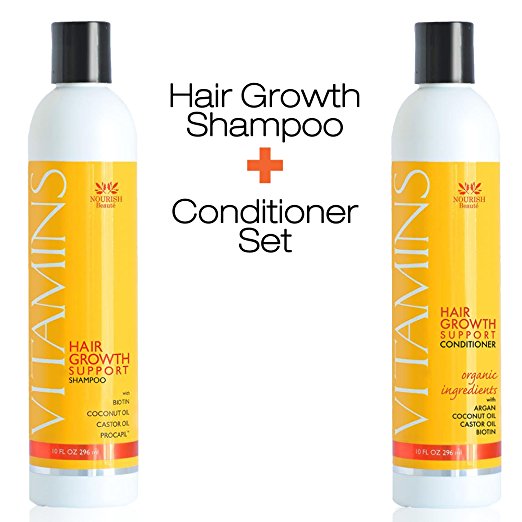 View on Amazon
View on AmazonThese are two scientifically designed hair growth products that prevent further hair loss and start total growth restoration. Both products contain patented and clinically advanced hair restoration ingredients and organic botanicals. Nourish Beaute Shampoo includes argan oil, biotin, keratin, caviar extract. The conditioner contains patented ingredients and natural components, such as caffeine, jojoba and coconut oils. Infuses all thickening agents directly into roots and into follicles. These two products reactivate sluggish roots and scalp, stimulate regrowth.
Pros- FDA-registered
- contain organic botanicals
- is a non-prescription set with clinical trials
- are good for men and women with all hair types, including African American hair
- work better and quicker together as a set, you’ll need to buy them both
- give slower effect if used without medications
#2: Ultrax Labs Hair Plush Thickening Serum
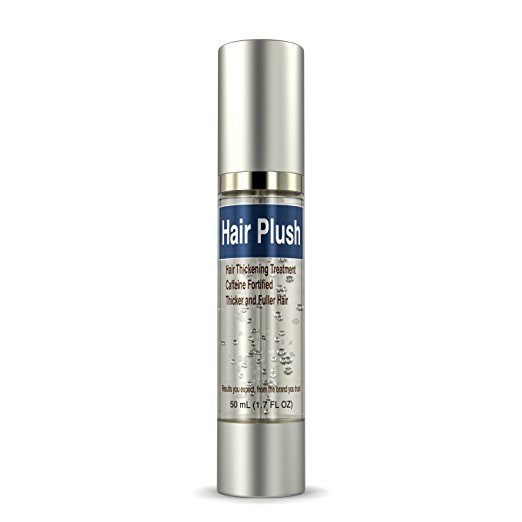 View on Amazon
View on AmazonApart from shampoos and conditioners modern hair growth products include different hair serums. The break through caffeine innovation technology of Ultrax Labs Hair Plush provides long lasting hair thickening effects. Leave in lush caffeine formulation increases hair growth and minimizes hair loss. Hair Plush Serum contains one of the most effective hair oils — peppermint oil, hydrolyzed keratin, biotin.
Pros- caffeine fortified to revitalize hair follicles
- are safe even for individuals with caffeine sensitivity
- decrease premature hair loss
- effective for men and women
- 90-day money back guarantee
- if the scalp is sensitive, can cause redness
- contains alcohol
#3: Boldify Hair Thickening Spray
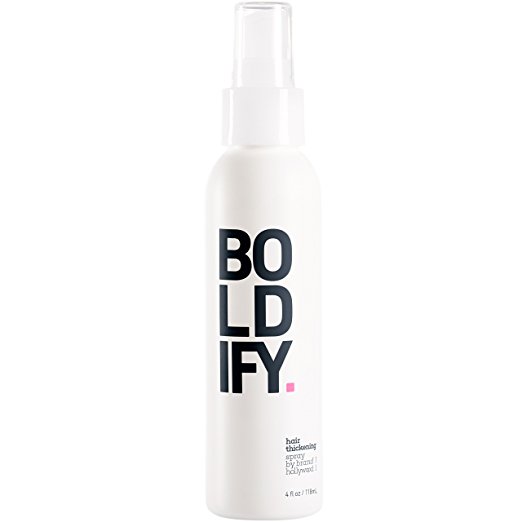 View on Amazon
View on AmazonVolumizing products, i.e. sprays, do not work if you are suffering from alopecia, but help in case your locks are thin and need some additional body. The principle of using it is simple, you spray your damp hair, then dry it and get the root volume and some layered texture for the whole day. Does not leave a sticky build up in hair, washes out easily. Great as a pre-styler, suits all hair types. Doesn’t contain harmful chemicals.
Pros- gives instant effect
- is good for fine and thinning hair
- contains a UV protectant
- has non-sticky formula
- absorbs excess oil and moisture
- is sulfate-, gluten- and paraben-free
- thickens hair temporarily, does not defeat the hair loss problem itself
LLLT: A Professional Salon Treatment at Home
The term ‘hair thinning’ can refer to either 1)reduced thickness of hair or 2)reduced number of hairs. In both cases, laser therapy can be an effective solution, helping you stop the progression of hair loss.
However, such in-salon hair treatments can cost a staggering $2,000 to $4,000 a year! Thankfully, we’ve found an alternative that is highly effective – and won’t break the bank.
LLLT stands for low-level light therapy, and is also often called laser phototherapy (LPT). This laser treatment penetrates scalp tissues (≈5 mm), activates microcirculation and lymph flow, and ‘awakens’ the inactive dormant hair follicles.
LLLT will be beneficial if you’re suffering from excessive hair loss, such as Ludwig and Savin Scale between Class I to II – but is unlikely to work for hair loss in an advanced stage.
LLLT is equally effective on hair that’s dull and weak, and is sometimes used as recovery therapy after hair transplantation in the first 30 days – as well as after radiotherapy.
There are plenty of laser combs, helmets and caps on the market – and finding the most suitable LLLT option may be a challenge. How do you make the right choice, then?
Reviewers lean toward caps and helmets. Yes, combs and brushes cost around $100-300, but they have fewer lasers (often only about a dozen or two), provide less coverage and require continuous brushing. Plus, laser helmets and caps have a lot of pros:
- Ease of use. Most laser devices run on batteries, are easily portable and hands-free. Which means you can wear them at home, in the car, or at work – whenever and wherever you fancy!
- Efficiency. The effectiveness of laser devices depends on various factors, such as health issues, whether you are undergoing any other treatments and the severity of your hair loss. However, laser devices were proven to be effective in 90-95% of studies. Moreover, new hairs grow much healthier, thicker and shinier! Plus, for those of you who are a tad older – the new hair is often not gray!
- Safety. Cold lasers, used in laser caps and helmets, are safe and cause no heat damage to the scalp and hair. Also, devices have no side effects compared with medicines. EMF exposure, which can sometimes be a concern to those considering the treatment, won’t be more than what your Wi-Fi exposes you to! Plus, the treatment is non-invasive, i.e. painless.
- FDA-clearance. The Food and Drug Administration assures patients will be safe while using the product for treatment – and that’s always a bonus!
- Universality. All devices can be used by both men and women, who suffer from thinning hair, hair loss or male/ female baldness. They work for all hair types, textures and colors!
- A risk-free purchase. You get results – or your money back. You can return the device and claim a full refund if it hasn’t worked as well as you expected. Yup – and no questions asked!
- Economy. On average, hair transplantation costs $10,000, while hair loss drugs will cost you about $500-$1000 per year. Laser caps and helmets are a one-time purchase, and will work for about 5,000-6,000 hours (that’s thousands of treatments!).
Here are some of the best laser devices for hair growth on the market.
#1: Grivamax Hair Growth Laser Cap
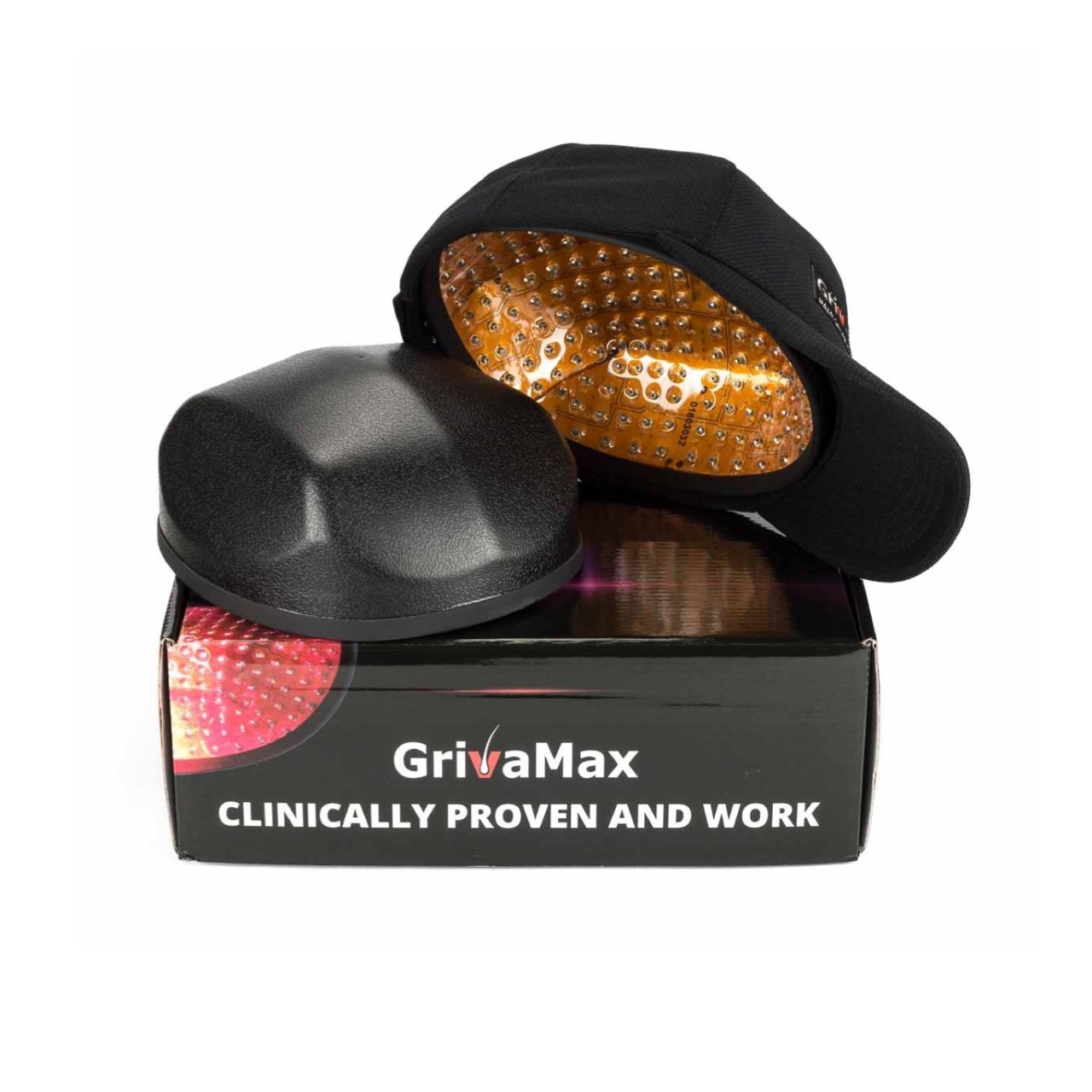 View on Amazon
View on AmazonGrivaMax 272 Pro is a cap with 272 lasers. The power of each diode is a regular 5 mWt 650 nm. The device covers 2/3 of the head and one size fits all. This means that you will be able to share it with other members of your family – if you like! The laser cap is supplied with a universal adapter for international use. The packaging also includes a clip-on leather case for a battery pack, and a carrying case. GrivaMax cap has to be used at least 3 times a week, for 20-30 min. Results are usually seen in 12-25 weeks. Treatment may be complemented by Minoxidil 5% with a DHT blocker, or microneedling (derma roller).
Pros- Programmed shut off time (30-minutes)
- Equipped with a 5000 mAh power bank battery
- Long USB cord (4 ft.)
- 6-month money back guarantee; 1-year warranty (the warranty doesn’t apply to batteries of the power bank, they can be replaced)
- Has no age restrictions, but is recommended for 18+ women and men
If you don’t suffer from excessive hair shedding and simply want to improve the condition of your hair, consider a GrivaMax’s model with fewer diodes – a Laser Cap 148.
#2: IRestore Laser Hair Growth System
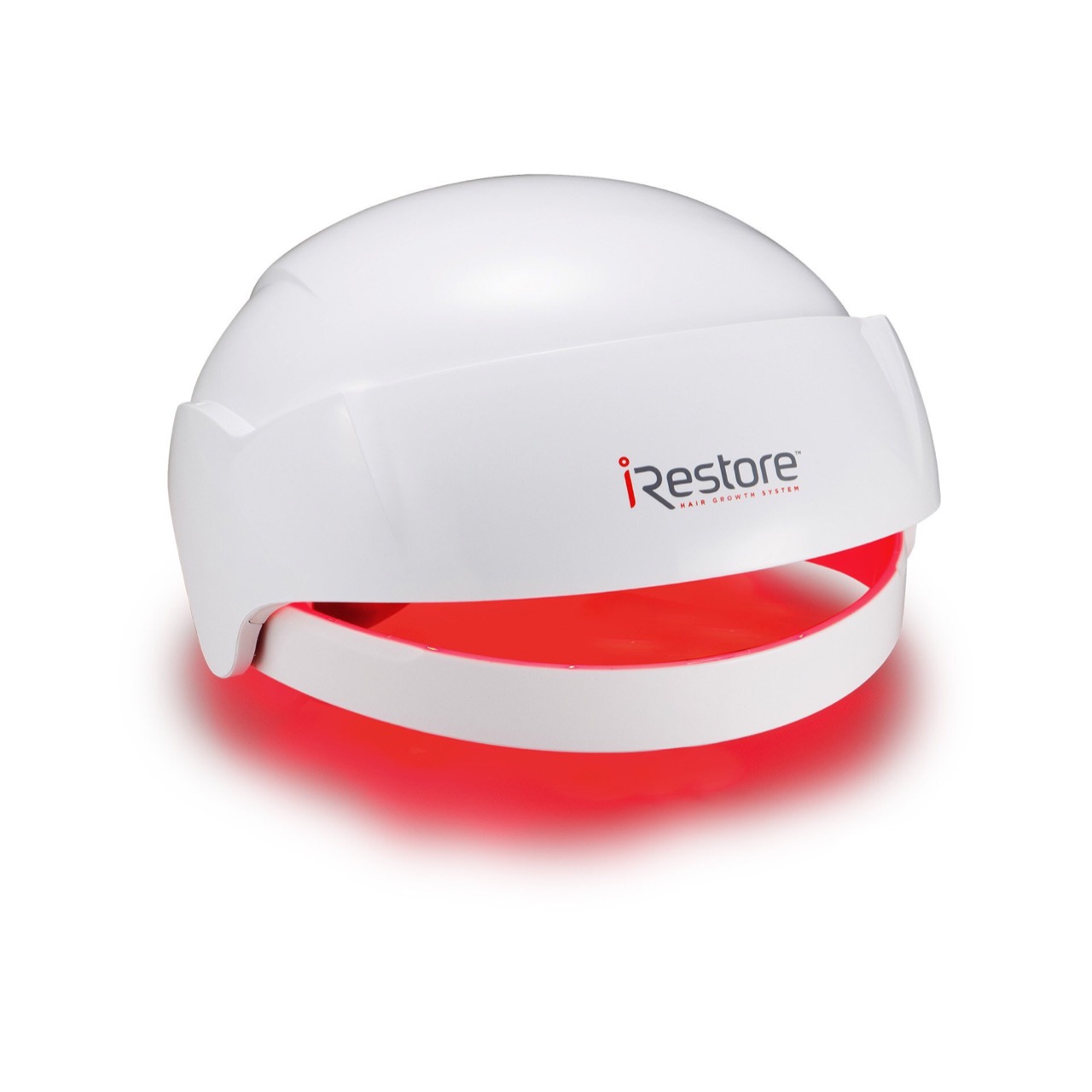 View on Amazon
View on AmazonThe iRestor’s 4-month study, carried out last year, showed that all active users of this laser helmet experienced hair growth! The average increase in hair count was 43.23%. The iRestore’s Laser Hair Growth System contains 21 medical grade lasers plus 30 medical grade LEDs. The size of the helmet is around 23 inches together with side foam pads. Adjustable components inside provide proper fit and comfort for all head shapes and sizes. The device is multi-voltage, but it requires a wall plug adapter while traveling. Visible improvements with this helmet will be seen in about 3-6 months and the laser treatment may be paired with an iRestore’s 3-in-1 Hair Growth Formula.
Pros- The automatic shut off timer (25 minutes)
- Although it looks massive, it feels lightweight
- Produced by the brand`s GMP-certified partner, certified safe by Intertek Testing Services
- 6-month 100% money back guarantee
- For mobility, you will need to buy a rechargeable battery pack
#3: Theradome Hair Growth Hat
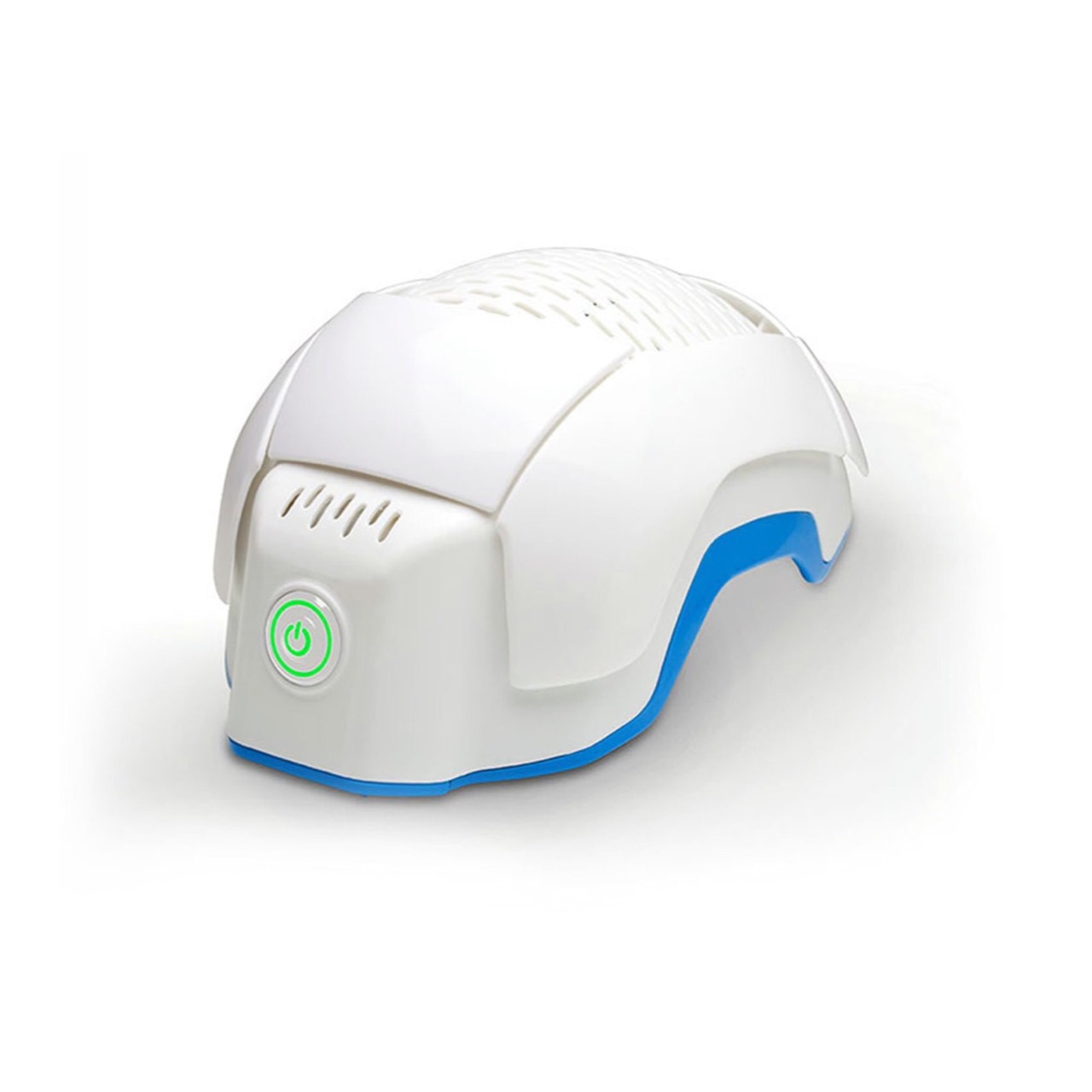 View on Amazon
View on AmazonDesigned and made in the USA, the Theradome LH80 Pro has 80 proprietary lasers with a 678-nm light. According to the manufacturer, the device should be used just two times per week. If used daily, it is advised to leave a 12 – or even 24 – hour gap between the treatments. The helmet is cordless, the packaging includes a helmet bag, a case, a charger, and several foam pads (it fits 98% of heads!). It has a built-in multi-language speaker that keeps track of the number of treatments done and tells when the helmet needs to be recharged. The device is compatible with multiple voltages (100 – 240 V). First hair improvements – shine and manageability – may be seen in just 18 weeks!
Pros- The automatic shut off timer (20 minutes)
- Automated counter of treatments (useful if just one person uses it)
- A sensor that activates lasers only when the helmet is on the head
- May help with itching and dermatitis
- A 120-days full money-back guarantee
- Easy-to-update software
- Works with Fitzpatrick Skin Types I to IV, treatment of two other skin types hasn’t been documented
- The money-back guarantee is only for purchasers from the USA
You may be wondering whether you will need to continue using the cap or helmet after seeing satisfying results – and that’s a perfectly good question. The truth is that – if your hair thinning is genetic – you’ll probably continue experiencing it if laser treatment is completely stopped.
However, some physicians recommend taking a break every now and then, so that your hair doesn’t get used to the therapy. For advice relating to your particular case, consulting your doctor is a wise choice.
Home Remedies for Thinning Hair
There is a wide variety of home remedies that have been around for generations. Even men and women who aren’t experiencing hair loss utilize these at-home treatments to boost volume and sheen — both of which can conceal thinning hair.
Eggs
Regular protein treatment can come in the form of raw eggs beat in a bowl and added to the length of hair for approximately 30 minutes. Some prefer to use one egg combined with a tablespoon of hair oil and two tablespoons of water. Mix it up and massage into the scalp. Repeat weekly.
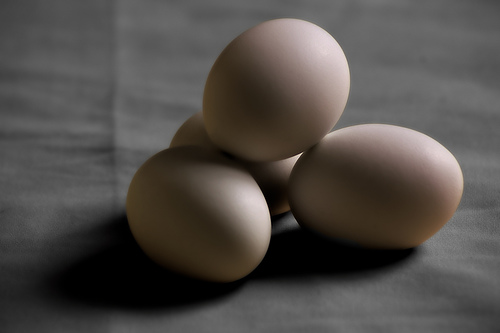
Photo Credit: paurian, cc
Olive Oil
Another old school favorite, olive oil definitely adds body to your hair. There’s speculation it can strengthen your locks, too, including the roots.
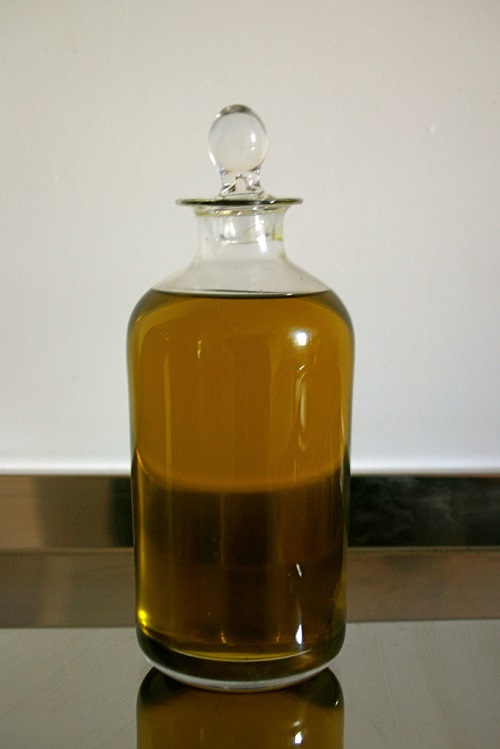
Photo Credit: Arthur40A, cc
Fenugreek Seeds
Pick these up at a health food store and soak 2-3 tablespoons in water overnight. Grind them to form a paste and apply to your hair and scalp. Leave in for 30 minutes and rinse with lukewarm water. If you do this weekly, some studies show it can prevent scalp dryness.

Photo Credit: graibeard, cc
Indian Gooseberry
Tough to find but potentially worth it if you can hunt it down, it may help with a healthy scalp and better hair growth. Mix a tablespoon of gooseberry with two tablespoons of coconut oil. Heat it up until it comes to a boil. Strain the oil and massage the mixture onto your scalp. Keep it in overnight and shampoo in the morning.

Photo Credit: prashantby, cc
Castor Oil
Castor oil has long been touted as a cure-all for many ailments, and hair loss seems to be no exception. Massage your scalp regularly with cold-pressed castor oil and potentially enjoy thicker hair. It is a very fatty kind of oil, which can protect your hair against falling follicles.

Photo Credit: D H Wright, cc
Hairstyles for Thinning Hair
Outside of the salon, you can learn how to make hair look thicker by switching your part. This will bring instant volume to hair that has flattened from remaining in the same position for too long. Also, avoid blow dryers — heat damages the hair shaft. The same goes for brushes — only brush when necessary, and avoid wire/metal combs.
Play with your hair to discover different styles that make hair look its thickest, but don’t pull hair back into ponytails or buns too often, as this can stress and strain hair follicles and aggravate the issue.
Finally, take advantage of the gorgeous hair accessories available for purchase. It’s an affordable way to conceal thinning hair. Try a hairband that covers the scalp, a beautiful scarf or even a hat. It might seem too simple and only a way to mask the problem, but on busy days, it is likely just what you need.
Going to the salon can actually help with thinning hair in women, although it really masks the issue rather than solving it. Nonetheless, it can make you feel like a million bucks and help you to focus on more important things in life.
Ask for a shorter, volumizing cut. Short cuts are gentler on thin hair. If you allow your hair to grow out long, it will start to separate in thin locks and expose regions of the scalp. Instead, go for a shorter length, while requesting layers. Many stylists are familiar with hairstyles for thinning hair, so don’t be afraid to have an open dialogue.
Hair color can also be helpful. According to Beverly Hills colorist Michael Canale, “Peroxide doubles the thickness of each strand. It swells the hair shaft…” Strategically placed highlights can detract from thin patches by making your hair closer to the color of your scalp.
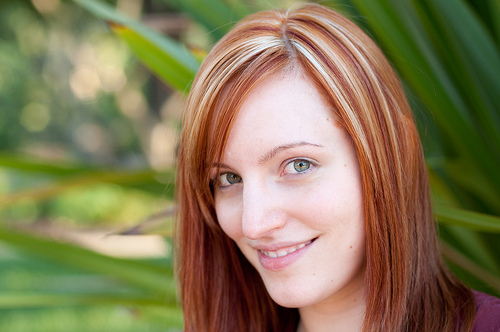
Photo Credit: nixiepixel, cc
Contrary to popular belief, hair extensions may not be among good solutions for thinning hair if you are experiencing hair loss. Rooted, naturally thin hair is fine, but those experiencing scalp exposure are not usually good candidates. However, if your hair is full at the crown but thinning only from the ear line downward, extensions are definitely an option. Celebrity hairstylist Ken Paves says that clip-ins are best and most affordable. And best of all, they are surprisingly simple to use.
When it comes to thinning hair in women, it can be a difficult journey both physically and emotionally. As females we are raised up to take pride in our hair’s appearance and unfortunately many of us place our worth in it. While every woman is beautiful in unique ways (regardless of hair texture), maintaining a full head of hair can do wonders for self-esteem. Take the steps toward testing some of these home remedies and easy solutions, or consult a medical professional if you still have concerns and find the DIY hair thinning treatment to be ineffective. With today’s modern medicine and continual research, thinning hair is a subject that’s full of hope.

